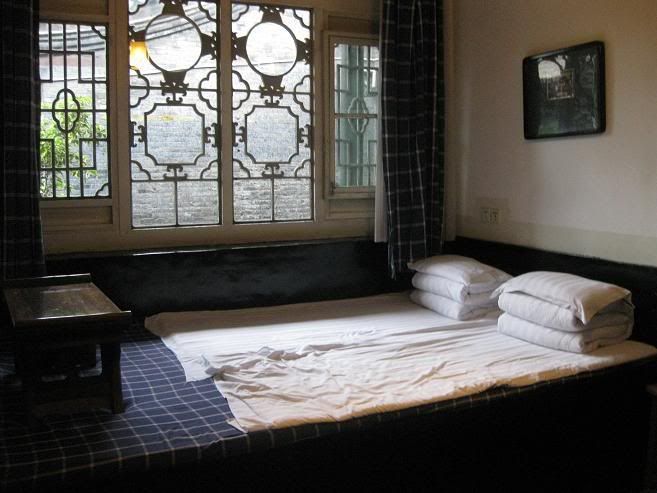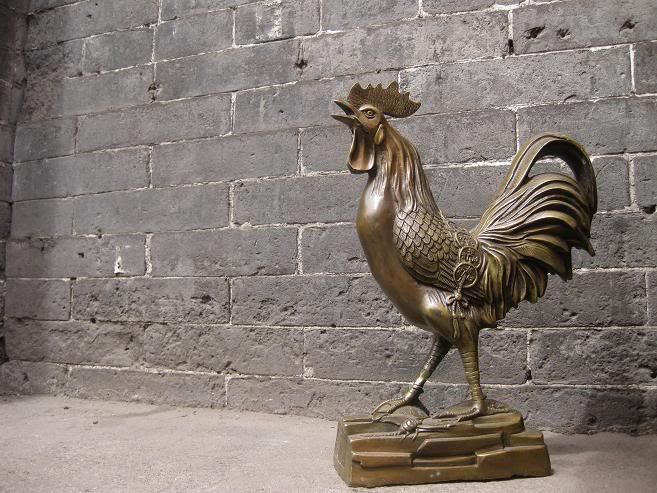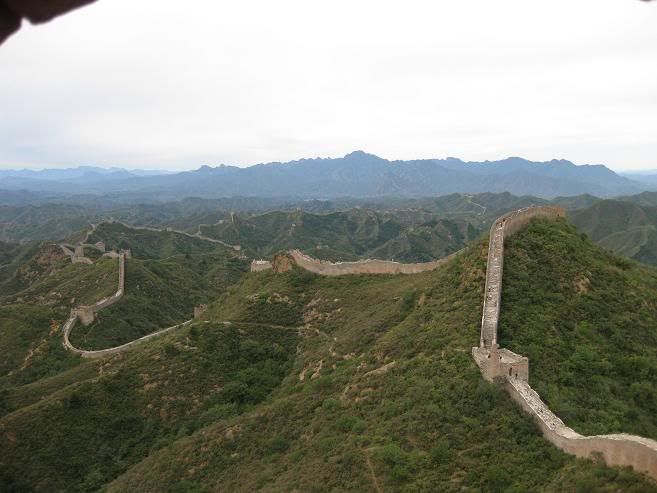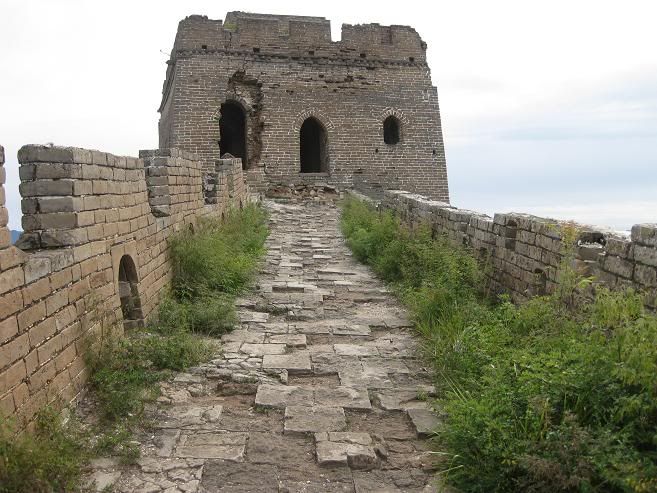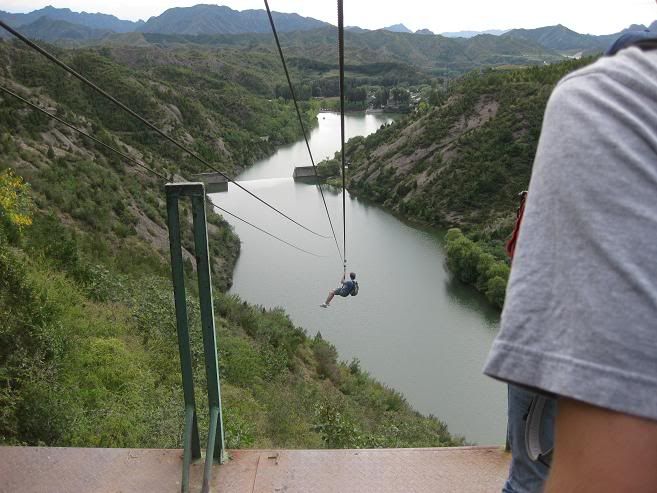Wednesday, September 30, 2009
Hmm
I apologize for the lack of updates over the past week or so. I've been in Bangkok and I have been extremely busy. At the end of each day I was just too tired to write anything. Tomorrow we are flying to Calcutta, India. I am both excited and nervous. I hope to write a lot on the plane trip. Bangkok is a great place and I am sad to be leaving. More soon, promise!
Saturday, September 26, 2009
Hong Kong
We could have taken a bus back to Guiling, then taken a sleeper train to Guangzhou, and then taken either another bus or train to Shenzen, and then taken a final bus to Hong Kong. But we figured it would be quicker and easier to just take a bus straight from Yangshuo to Shenzen, which is just across the border from Hong Kong. Boy were we wrong.
First, the bus arrived an hour late to the bus station.The bus company claimed that there was an accident on the road, but I have my doubts. I think they were late because they were loading contraband into the bottom of the bus or doing something else equally nefarious.
The bus itself had an insane layout, albeit a very cramped one. Unfortunately, the pictures I took didn't come out very well, but basically the bus consisted of three rows of six double decker cots, which allowed for thirty six people to sleep on a single bus. This efficient but utterly cramped layout was made possible by elevating the upper portion of each cot so that the next cot would slide in underneath. In other words, my head was basically on top of someone's feet, and my feet were underneath someone's head. Can you say sardines?
In any event, the voyage was supposed to take ten hours, dropping us off in Shenzen at about 6 am. From there, it would be another couple of hours of local buses and metros to get to downtown Hong Kong. In reality, we didn't get to Shenzen until past 10 am! Why? Because the bus driver and his assistant kept inexplicably pulling over on the side of the road and doing something. It was the middle of the night, so I wasn't really sure what was going on, but at one point we were stopped for what seemed like about 45 minutes. This happened several times.
In the morning, when we were what seemed like very close to our final destination, the bus pulled off onto a side road in Shenzen and came to a standstill. Then, the driver's assistant and some other guys began unloading tons of cardboard cargo boxes from the luggage storage. Why were wholesale goods being transported on a civilian bus? Why were they doing it on my time? I was getting really frustrated.
It would have been a funny story, except we had a very important reason to get to Hong Kong by the morning. Mimi still hasn't got a new visa to go to India, and we had to get over to the India Consulate to get things sorted out. Unfortunately, due to the tardiness of the bus, we weren't able to get to the consulate in the morning. We went the next day, but they are telling us that it might not come through until next Tuesday. That would be really bad, because we are supposed to fly to Thailand on Saturday. It's looking like I might go ahead to Thailand and Mimi will stay in Hong Kong until she gets her visa. We are trying to keep our cool but its been a very frustrating experience.
UPDATE: At the time of writing, everything has worked out with Mimi's visa. Still, we spend a decent portion of our time in Hong Kong waiting around at the Indian Consulate and making phone calls in the middle of the night on Skype to their office in New York. We knew all along they'd give it to us, but we also knew that they'd make us wait until the very last minute. It's the unspoken credos of all embassies world wide. Make them wait. They know no other method.
In any event, we arrived in Hong Kong by the early afternoon. By mistake, I had forgotten to get directions to our hostel before we left Yangshuo. But after a bit of searching on the map, we found the right street and hopped on the MTR. The MTR is Hong Kong's super efficient subway system. It's incredibly quiet, clean and accessible. It's also much more expensive than the subways systems in Shanghai and Beijing, with an average trip costing $1-2 USD. We got off at Mongkok East station and began looking for the correct address. When we finally found the building, it was filled to the brim with cell phone stores. Literally every commercial stall in the entire building was selling phones, selling phone accessories, or offering repair services. Our hostel was supposedly on the 7th floor, but we couldn't find an elevator. After three stories of endless cell phone stores, we started asking around. It turned out that the residential entrance to the building was around the corner. No space is wasted in Hong Kong. Everything is overlapping with everything else.
A nice man led us to the proper entrance and we found the hostel. The building seemed to be a mix of budget hostels and private apartments. Overall the building looked like it had seen better days. When we got to our room, I couldn't believe my eyes. I had never seen a smaller accomodation in my life. The room, which was by no means cheap compared to China, was about 6x9 in area. A small double bed went wall to wall and took up perhaps 75% of the room itself. There were no windows. The bathroom was about 4x4 and doubled up as an "everything gets wet" shower. In Hong Kong, no space is wasted. I had read online forums that warned of small hotel rooms, but this was unlike anything I had imagined. Ce la vie.
Hong Kong is very unique city. First off, its unbelievably crowded. Mongkok, the neighborhood we are staying in, is on the Kowloon Peninsula, which is the hub of commerce, restarurants, and just life in general. Every street is packed to the brim with various shops, and often the commerce spills out into bootleg stalls that eat up the actual streets. Often, commericial establishments climb much higher than the first floor. For example, one building we passed had fifteen different bars; one on each floor. The larger avenues are dominated by the hundreds of double decker buses that supplement the MTR rail system. Across the bay lies Hong Kong Island, which is technically the downtown area and is mostly filled with skyscrapers, financial institutions, and upscale commerce. But Kowloon felt like the real Hong Kong. A place where people actually live and thrive.
I wasn't sure if I was going to like Hong Kong. I knew that it was a "global financial center," what ever that means. I also knew it was crowded and offered a very different culture from the rest of China. After a few days here, I've come to the conclusion that I really like this city. In fact, I love it. The one thing that was holding me back from falling in love was the cost of living. Hong Kong is considerably more expensive than China. Beyond our accomodations, food and transportion were anywhere from twice to five times as much as they were in China. But we are only here for a few days, I told myself, so I stopped obsessing over the bills, and started enjoying myself.
The unique culture of Hong Kong is a product of the British colonial legacy. Although it is technically now part of China, it still has its own financial and legal systems. No websites are blocked here. On the contrary, Hong Kongers (is that the right term?) seem to have reached an advanced level of cultural saturation. Sex, violence, and various cultural extremes aren't anything new here, whereas in China, this type of culture overload (mass media + mass consumption) was still nascent. Mass media goes hand in hand with capitalism, and in Hong Kong the ghosts of communism are nowhere to be found. Capitalism is the name of the game here, and it has been for over a century. Whether it wanted it or not, Hong Kong has had a long history of foreign trade and cultural interaction. As a result, nearly everyone here speaks English. In fact, Westerners can be found everywhere in Hong Kong and seem to make up perhaps 5-10% of the cities population (in my estimation). But that's just one of the ways that Hong Kong differs from China.
In China, the rules for just about everything are very lax. If a bus is full, you push your way on. If you want to cross the street, you walk in front of the cars until they stop for you. If you want to smoke a cigarette, you light one and inhale. Public bathrooms... well I won't even go there. While all of this was a shock to me upon arrival in Shanghai, after a few weeks I was totally used to it, and had actually become quite good at crossing the street and biking around in Chinese cities. When we got to Hong Kong though, everything was different. Yes, Hong Kong is an incredibly crowded and fast paced city. But it's also incredibly organized and surprisingly polite. With all due respect, polite is not an adjective I would ascribe to the Chinese people. Chinese people like to yell. In Hong Kong, it's a totally different vibe.
Here, people line up in orderly queues when boarding the subway cars. No one jay-walks. In fact, guard rails line most of the city streets, suffocating my inner New Yorker and squelching my burning desire to cross the street against the light. Whereas spitting is China's unofficial national pasttime, no one spits in Hong Kong. For a city of 7 million active people, Hong Kong is remarkably clean. "Disinfectant Stations" blanket all public areas. Signs in elevators seem to compete for the most sterilizations per day. The giant garbage piles I grew accostomed to in China are nowhere to be found. Best of all, virtually every bathroom I've used, including ones at train stations, have been spotlessly clean. I actually enjoy going to the bathroom in public in Hong Kong. The future is now!
Speaking of the future, sometimes walking around Hong Kong makes me feel like I am in the movie the Minority Report, starring Tom Cruise. Soothing voices tell me when to exit the train. Outdoor public walkways seemlessly transform into sleek, glass-paned corporate atriums (atria?). Everything works so well here, it's almost eerie. On the rare occasion, I even got a little whiff of an Invasion of the Body Snatchers vibe.
But OK. That's enough flattering commentary for Hong Kong. What are the downsides? Well, the crowds can be a bit overwhelming. But I am a city boy, and I thrive on crowds. To put it one way, I'm actually excited to venture through India's notoriously complex and overcrowded train stations. What a thrill! So I can handle Hong Kong.
The real downside to Hong Kong is the food. First, the food here is extremely heavy and it is a mystery to me why obesity isn't a problem in this city. The choices are often fried or deep-fried. But the real problem is that Cantonese food is notoriously meat-oriented. Even vegetable dishes are cooked with meal oils and broths. We came to town under the assumption that every dish had meat in it and were very nervous about the food we ate the first day. This included some noodles at a local joint near our hostel, and some Japanese food for dinner. None of the food was particularly good, but none of it tasted overtly of meat, with the exception of some fish flakes on the Japanese dishes.
But sure enough, at about two in the morning that night, Mimi woke up and nauseously stumbled to the bathroom. Woken up by the bathroom light, I walked the two feet to the bathroom to see if she was OK. When Mimi told me she was so dizzy that she couldn't stand up, I became very concerned. Was it vertigo? The flu? Or maybe just food poisoning. We then waited patiently for the fireworks to begin. I'll spare the details, but Mimi's Hong Kong food poisoning experience is one that we are both happy to leave behind us. We woke up the next morning and scoured our veggie bible, www.happycow.com, for some restaurants in Hong Kong.
Lucky for us, behind all of the beef balls and bird's nest stew, Hong Kong is teeming with dedicated vegetarian restaurants. In fact, in the past two days we've had some of the best Asian-style vegetarian food either of us can remember. One of the highlights was a place called Harvester, which is a popular buffet-style restaurant in the downtown area. It was so good we actually went back for a second time! The best meal, we had though, was at Evergreen Vegetarian Restaurant, which was coincidentally just a few blocks from our hostel. The Asian-style BBQ ribs were phenomenal, as was the interesting Cold Fish in Sweet Sauce.
So other than pray for Mimi's India visa to come through and hunt for vegetarian restaurants, what did we do in Hong Kong? We acted like tourists! On the second day, the most fun thing we did was take the Peak Tram, which goes from the downtown area up to the top of the mountain on Hong Kong Island. Luckily, it was a clear day and the views from the top were top-notch. We spent the rest of that day exploring the downtown area and looking for interesting back alleys, of which we found a few.
The next day was mostly eaten up by India visa related duties. But in the late afternoon, we ventured out to Lamma, which is one of Hong Kong's smaller, quieter islands. It turned out to be one of the best parts of Hong Kong. In a city of seven million, it is remarkable that Hong Kong designated Lamma Island as a car-free, eco-friendly community. After we got off the ferry, we wandered through a small village of seafood restaurants and eventually arrived at a little beach. The island had a very funky vibe and both Mimi and I really enjoyed the hike. After about two hours, we arrived in another small village that also was filled with seafood restaurants. I had some fresh scallops and fish, both of which were totally delicious!
Overall, I had a blast in Hong Kong. Even though it drained my wallet a little more than I would have liked, I'm really glad I came here. Maybe one day when I'm a high-roller I can come back and do some more exploring here. The next stop for us is Bangkok, a city that I am unspeakably excited to explore. Stay tuned for more updates!
Wednesday, September 23, 2009
Chinese Food
I'm not really sure where to begin. Well, for starters, Chinese food in China is pretty different from American Chinese food. Sure, in both cuisines most of the sauces are based on some combination of oil, vinegar, soy sauce and chilies. But the American version tends to be much sweeter. For example, in China there is no such thing as ubiquitous General Tso's Chicken (or Tofu). The syrupy sauces that tend to dominate American Chinese food can't really be found in China.
Another difference is the role of tofu. In American, people usually see tofu as a meat substitute. It is very uncommon for a tofu dish to have meat in the United States. In China, tofu is seen as just another awesome thing you can eat in addition to meat. In fact, many traditional tofu dishes actually have meat in them.
Yet another difference is the role of rice. In the United States, rice automatically comes with any main dish and is free of charge. In China, you have to ask for rice if you want it with your meal and you have to pay extra for it as well. Rice is served in a small round bowl, which you then use as a pit stop for each bite as it travels from the original serving dish to your mouth. Mimi also told me that many Chinese people don't like to eat very much rice, because this implies that you are poor and can only afford rice.
And yet even another difference is how people eat the food! In America, it is not uncommon for each person to order their own dish in a Chinese restaurant. This would never, ever happen in China. Even if you are eating with only one other person, food is always communal, and people would look at you like you were crazy if you tried to order your own dish.
And the very last difference that I can think of between American and Chinese Chinese food is that in China, fortune cookies don't exist. This is a purely American creation.
OK. So where does that leave us? Well, for starters, some of the best food I had was in Shanghai right at the beginning of the trip. Perhaps it was that I wasn't sick of Chinese food yet. Or it could have been the variety of restaurants we ate at. There are tons of different styles of Chinese cuisine and Shanghai has them all: hot pot, Schezuan, country style, northern, Buddhist, Xingjian noodles. You name it!
But I think the real reason the Shanghai meals were so good was because Mimi's father, Yuheng, ordered all the food for us. I don't know what it is, but that guy really knows how to order. In China, it is very common for one person to order for the whole table, and this is usually a signal that he or she will pick up the bill. When ordering, it's important to get good representation. For example, a few cold dishes or crunchy snacks are always good at the beginning. And even for meat eaters, a vegetable dish is always essential. In any event, I had a ton of delicious food in Shanghai. For me, the highlights were the savory crepes I had nearly every morning, the spicy fish head I ate at the Schezuan restaurant, and the meal we had at Jade Buddha Temple.
But when we got to Beijing, we were on our own. We were also eating with less people, so there was less variety at each meal. While in Shanghai, Yuheng had often invited friends of his to eat with us, so there was more food to go around. As a side note, Yuheng also invariable introduced every single one of us his friends as an uncle. Uncle Philip. Uncle Gu. Uncle Li. Who knew Mimi had so many uncles back in Shanghai?!
By Beijing, I began to suspect that we weren't as good at ordering food as Yuheng. By Pingyao, it was confirmed. It wasn't that the food that we were eating was bad. It was just that Mimi and I tended to keep coming back to the same dishes. Ma Po Tofu, eggplant dishes, and sauteed greens had become reliable but somewhat predictable staples. It was in Pingyao that I caved in and had a couple of Western-style breakfasts.
As vegetarians, we also had to be vigilant about making sure no meat slipped into our dishes. For Chinese, using meat stocks and meat oils aren't really seen as eating meat, so unfortunately we had to steer clear of many soups. Additionally, some restaurants said they couldn't remove the meat from certain tofu or veggie dishes. So depending on the restaurant, our range of options could be limited. We made the best of it though, and perhaps more often than not, the Chinese food I ate was downright delicious.
At some of the more basic home-style places we ate at, we would often just ask what vegetables they had available, and the chefs would cook it up for us. These restaurant tend to be simple and cheap. Sometimes the result was boring, but sometimes it was delicious. You never knew until you tried it.
In each city, we tried to treat ourselves to at least one meal at a purely vegetarian restaurant. These places tend to be a bit more expensive and they can be hit or miss. Sometimes, mock meats are devastatingly flavorful and perfectly textured. Other times, they aren't much more than a hollow piece of deep fried nothing. Again, you never knew until you tried it, and that's part of the adventure.
Anyways, Chinese food in China is great. I can't think off the top of my head of any more interesting food-related stories, but I'm sure they will come to me at some point. In the mean time, here are some pictures of some crazy stuff we ate.
Street Soy Milk and Long Doughnut, Shanghai.
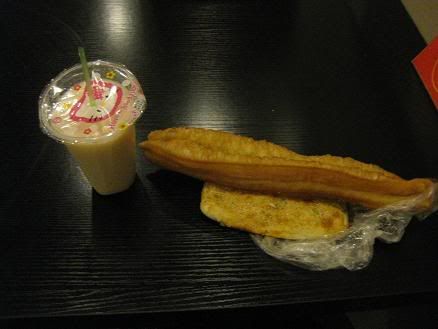
Jade Buddha Temple, Shanghai.

Lotus Root Stuffed with Rice, Godly Vegetarian Restaurant, Shanghai.
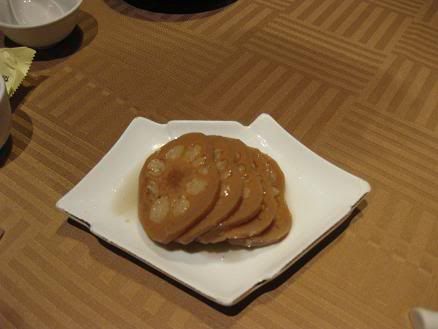
Hot Pot with Yuheng's Friends, Shanghai.
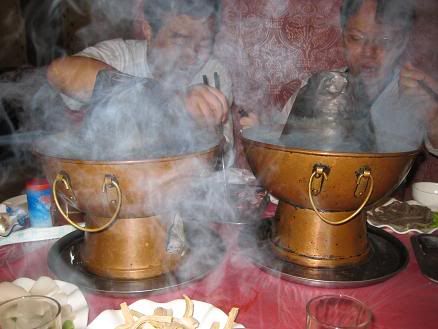
Fresh Mini Watermelon, Water Village near Shanghai.
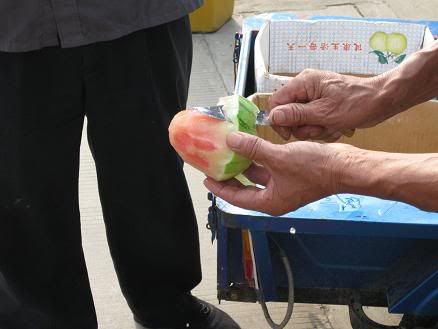
Tofu Rolls with Dipping Sauce, Veggie Restaurant, Shanghai.
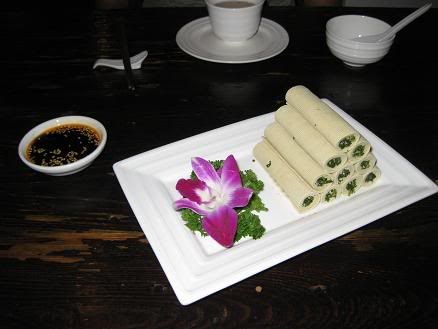
Cold Street Noodles with Tofu Puffs, Back Alley, Shanghai.
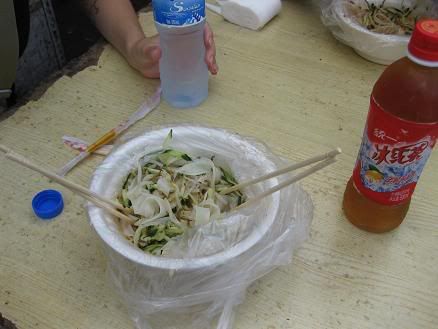
Mock Peking Duck, Beijing.
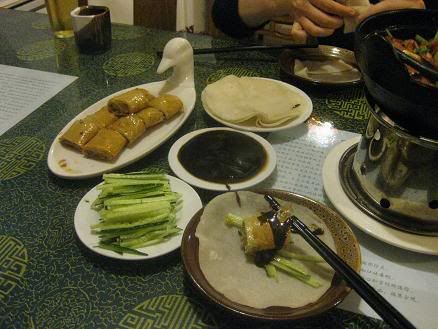
Sweet Potatoes with Mystery Balls, Pingyao.

The Mystery Balls were Weird.

Fresh Whole Roasted Macadamia Nuts, Pingyao.
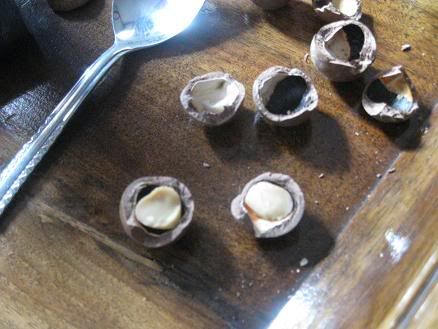
Passionfruit, Longji Rice Terraces.
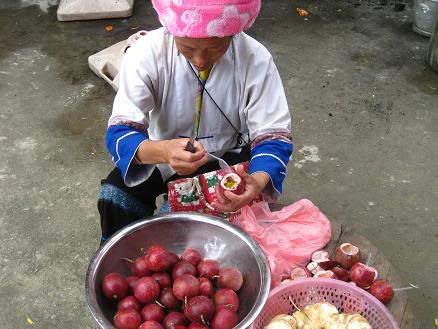
Monday, September 21, 2009
Yangshuo
We spent the morning of our first day here catching up on sleep and errands. But by the afternoon, the sun was beating down to the tune of 95 degrees and we knew it was time to get out and do something in nature. So we rented (typically beaten up) bikes from our hotel, and headed out to the Yulong River, where we had made reservations for a bamboo raft trip down the river.
The logistics of the bike/raft trip were kind of cool. We had set up the trip through Stephen, a short, beaming man who runs the West Lily Hotel with his wife. Stephen told us that a "farmer" would meet us outside the hotel on his motorbike, lead us to the river, throw our bikes on the back of a motor-cart, and transport them down to the parking lot at the end of the raft trip. We could then find our own way back to the hotel by bike.
The "farmer" turned out to be a really cool guy who spoke a bit of English. Whether or not he was actually a farmer I wasn't really sure. All I know is that he was obsessed with my beard. Every time he stopped to wait for us to catch up to him, and he would make beard motions and say "Beautiful!" You see, Chinese men may be able to grow wicked Fu Manchus, but no matter how hard they try, they will never be able to obtain full coverage. Any Chinese beard is destined to be scraggly in the mid-cheek area. It's just the way it is. At another point, the farmer tried to communicate something to Mimi in Chinese about my beard. At first she couldn't figure out what he was saying, but eventually she realized he was comparing my beard to the beard of Karl Marx! I forgot that everyone in China over the age of thirty knows who Karl Marx is.
After a half hour bike trip, we arrived at the Yulong River, which is smaller than the more popular Li River, but in my opinion much more gorgeous. As we waited for everything to get sorted out, an ancient hunchbacked woman approached Mimi. Her product: a fifty cent water cannon. After about ten minutes of this little old lady following Mimi around the parking lot, Mimi caved in. It was no Super Soaker 2000, but we had ourselves a water gun. Armed to the teeth.
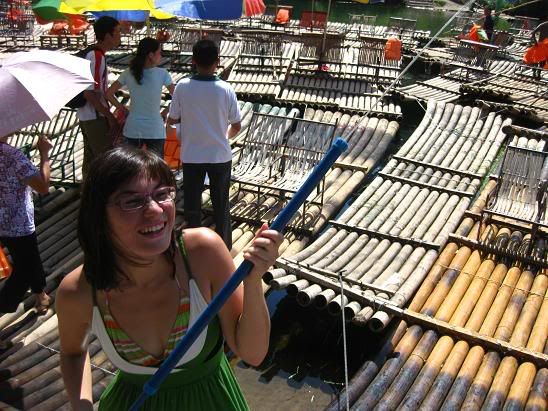
Eventually, the farmer led us to our raft and introduced us to our driver, a thin but strong man with bad teeth who used a ten foot stick to steer us down the river. We hopped on the raft, which was equipped with metal seats and a beach umbrella, and went on our way.
The ride was great. Occasionally, there would be a 3-5 foot dip over and down a levee, where they would take your picture as your raft careened down the rapid. They would then pull you to the instant photo lab stationed on a bamboo island in the middle of the river and try to get you to buy the picture. We successfully resisted purchasing the alleged photo of a lifetime, but we're unable to resist the temptation of the ice-cold beer station a bit further down the river.
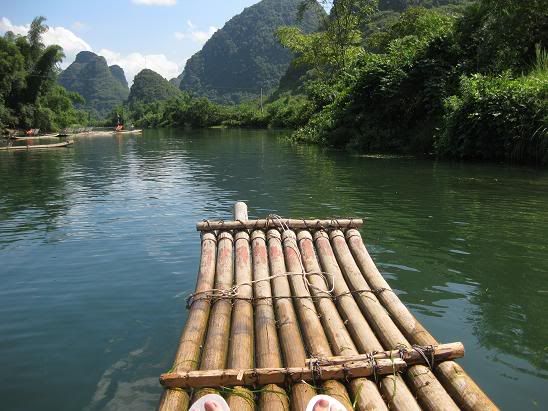
The scenery was gorgeous. I was able to get some great photos as well, a couple of which I uploaded to my last post. A bit further down the river, we realized that many of the island beer stands were also selling fresh grilled fish. We asked our driver if we could make a pit stop and I ate a little spicy fish from a skewer. It wasn't the most delicious fish I had ever had, but the fish was fresh and the experience was fun.

After a few hours, our trip sadly came to an end. We said goodbye to our driver, found our bikes in the parking lot, and biked back into town. As we got closer to town, we found ourselves amidst a giant swarm of school children who were biking back to their homes. They were very excited to see foreigners on bikes and many yelled hello to us and then giggled to their friends.
The next day, we succumbed to another of Yangshuo's tourist attractions, the infamous Water Caves. I felt a little strange about doing these "package tour" type activities, but after a little convincing, I let go of my reservations and embraced it.
The Water Caves themselves were a little underwhelming. As my father once said to me, "If you've seen one cave, you've seen 'em all." I would tend to agree. The highlight of the cave, however, was not the stalagmites that our guide swore looked like a bathing beauty or a rocket ship, but the mud bath and hot springs. We had come with our bathing suits and hopped right into the mud. After a quick rinse, we then hopped into the natural hot springs. I had never done this before and thoroughly enjoyed it. Nature's jacuzzi!
Perhaps the best part of the day though, was our bike voyage back into town. Instead of taking the direct route back on the main road, we decided to follow a bike trail that was listed on the map we had picked up at our hotel. Supposedly, it would lead us back along the Yulong River around the area we had been the day before. At some point, however, we took a very wrong turn, and ended up on a narrow, mostly stone path that went along the perimeters of the local rice paddies. At certain points, we had to get off our bikes and walk.
Eventually, it spit us out at the river's edge, right at one of the levees with the island photo lab! What were to do? We could either turn back and try to find the proper bike path, or we could attempt to cross the levee with our bikes. The problem was that the levee actually had about six to twelve inches of water gushing over the top. Naturally, we tried to cross the river.

I lifted my bike over my head and began to slowly walk across the river. I tried to avoid the green parts, which I assumed to be slippery algae. The current was stronger than I had anticipated but I made it over the first gap and paused at a little dry spot about a fifth of the way across the river. There, we met some Westerners who had also come with their bikes and were swimming around the levee. They warned us that they had made the same mistake the day before, and that even if we crossed the river, it would be pure rice paddies on the other side. But we had already made it this far, and we weren't about to turn back now.
One of the swimmers was nice enough to carry Mimi's bike across to the other side, and I followed him with my own bike held up over my shoulder. Slowly but surely, I made it to the other side. Occasionally, Chinese tourists on bamboo rafts would try to shoot me with their water cannons. I didn't mind though, because it was all in good fun and I was actually quite hot.
Sure enough, when we made it to the other side, we found ourselves in the middle of a maze of rice paddies. We walked our bikes along the narrow, damp paths that hug the rice fields and eventually made it to a real road. It took about thirty minutes of trudging through the paddies though, and by the end we were quite worn out and dirty and even a bit scratched up. Here is a picture of Mimi in the middle of the paddies.
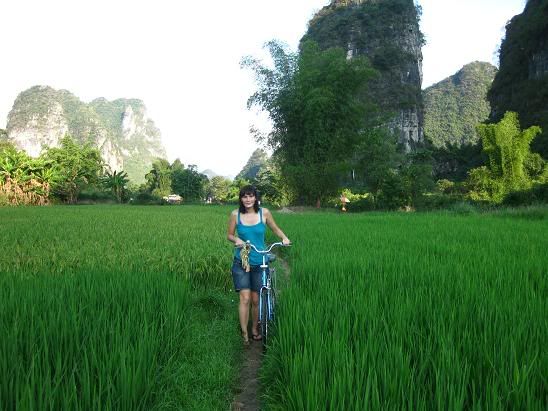
By the time we had made it back to a real road, it was nearly six o'clock. We decided to track down one of the little fish shacks we had seen along the river the day before and get some dinner. Mimi wasn't eating fish, but I was more than ready to eat some more of the fresh Yulong River fish. After a bit of biking, we found a place that had tables right at the river's edge.
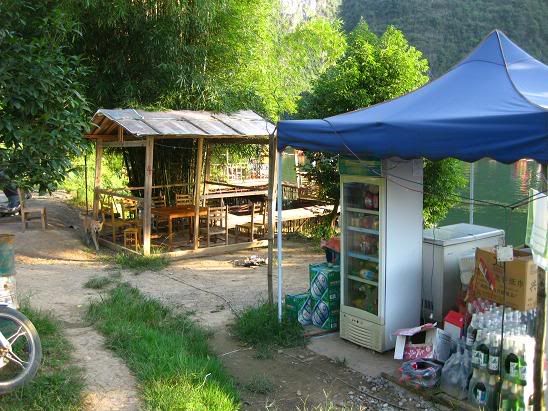
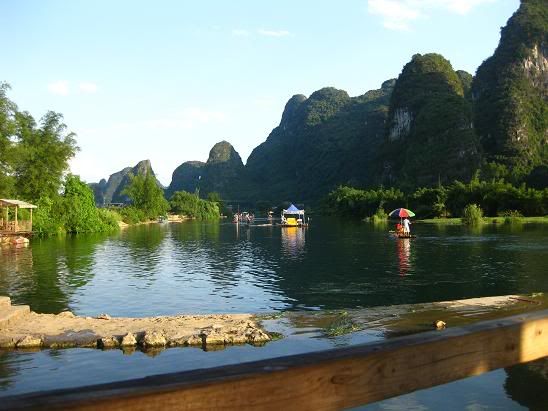
The food was delicious and the view was great. The only problem was that by the time we had finished eating, the sun had gone down and it was rapidly getting dark. We hopped on our bikes and found our way back to Yangshuo. The last mile or so of the trip back though was a bit scary, as we had low visibility. We were careful though and made it back safely.
The next day, we took a local bus to the village of Yangdi, a small town about an hour north of Yangshuo. We had read about a hiking trail that went south along the Li River all the way to a nifty little town called Xingping. When we got off the bus in Yangdi after a very bumpy ride, we were assaulted by a veritable army of ancient hunchbacked ladies who were all selling the same hand-made flower wreaths. This was on top of the swarm of younger touts trying to get us to take a boat ride all the way back to Yangshuo.
After a bit of confusion, we figured out that we had to cross the river by bamboo raft in order to begin the hike. There was only one other Westerner on the bus, who was also trying to do the hike. We ended up teaming up with him for most of the day. His name was Keiran and he was from southern Ireland. He had been traveling extensively for many years and had actually spent five months in India last year. As we hiked along the Li River, Mimi and I picked his brain for useful tips and advice about traveling in India.
It was fun talking with another traveler and the conversation made the hike pass by quite quickly. Every so often, a local boatsman would pop up and offer us a ride down the river to Xingping. Having done the raft trip a few days before, we weren't that interested, but Keiran seemed very excited by the idea. Eventually, we found someone who would do it for a reasonable price, so we did the second half of the hike by boat. I wasn't crazy about the boat, which had a motor engine and was made out of plastic instead of bamboo, but Keiran was beyond stoked, so we were happy to do it.
This portion of the river is very famous for its beauty and is even featured on the back of the 20 yuan note. With the help of some ladies on another boat, we were able to locate the exact spot and take a picture. After we got off the boat, I was able to get a picture of a pregnant water buffalo. I can't decide which picture I like better. You decide:

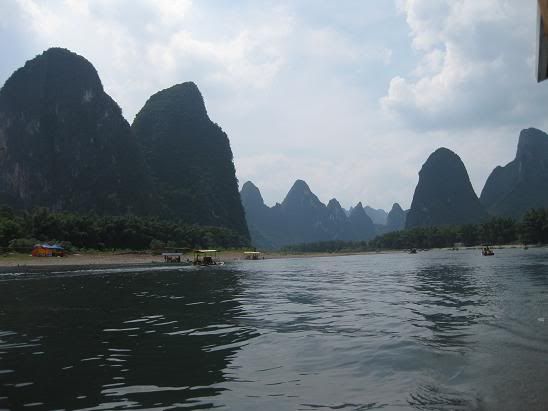
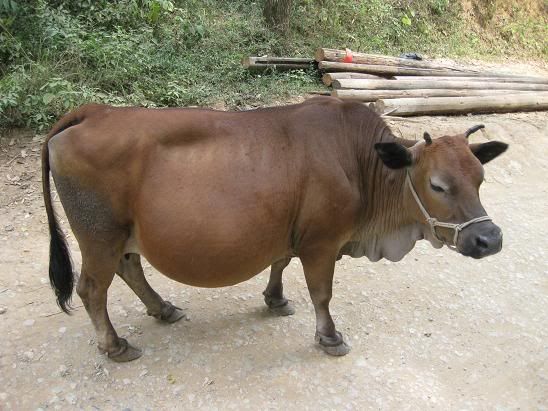
Eventually, we arrived in Xingping, which was a cute little town that reminded me a bit of Pingyao. The buildings didn't seem to go higher than two stories and life seemed a little bit slower and more traditional than the bigger towns and cities. In a bizarre coincidence, while we were eating lunch (noodles and fried duck eggs), we ran into Albert, the German lawyer who we had met on the train from Shanghai to Beijing. In a country of 1.3 billion people, you can't help but ask yourself, what are the odds?
After lunch, we walked a bit more around Xingping. Here are a couple of pictures:
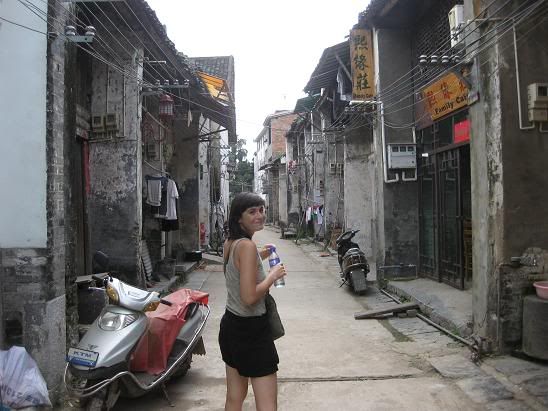
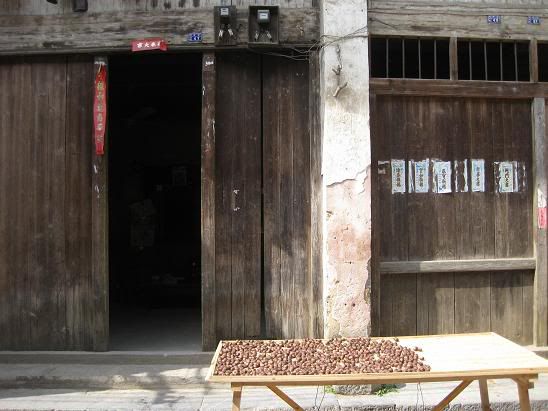
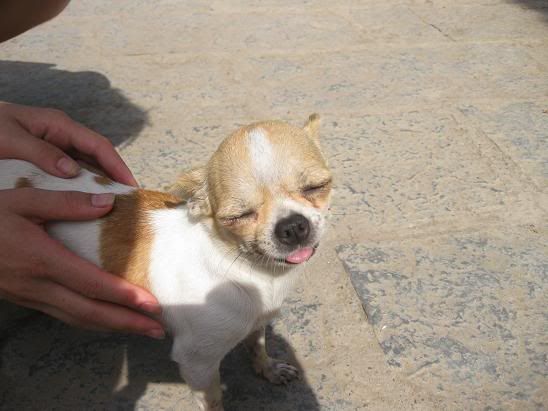
After a bit of wandering around, we were quite tired. We located the bus stop and hopped on the next bus back to Yangshuo.
That was yesterday. Today it has been raining for a good portion of the day. This morning, I looked around Yangshuo's local market, which featured some very brutal slaughtering of animals. I hope to post some photos from this excursion soon.
In the afternoon it cleared up though and we were able to go for one last bike ride (this time on a tandem bike) along the Yulong River. I got one last spicy roast fish (which I was unfortunately over charged for) and we biked back into town. In a couple of hours, we will be taking an overnight sleeper bus to Shenzen, which is just across the border from Hong Kong.
I must be honest, I am very sad to be leaving Yangshuo. Its relaxing and peaceful here. The people are nice and the countryside is phenomenal. I can only hope that one day I can come back.
Sunday, September 20, 2009
From the Rice Terraces of LongJi to the Mountains of Yangshuo
Oh I have neglected thee. It's been a very busy and tiring couple of days, and I just didn't have it in me at the end of the night to chart my adventures. But fear not, I am back. And, surprise, surprise, I have a have a lot to report!
I believe I last left off at the very cool Panorama Hotel in the Long Ji Rice Terraces. The next morning, we attempted to get up in time to watch the sunrise over the valley. A little sign in the lobby said the sun would rise as 6:30 am, so I set the alarm for 6:15 and hoped for the best. To our own amazement, we actually got up in time and headed out to the vista point. To our great dismay, the sun had clearly already risen. We had been handed faulty sunrise information. Next time.
So we went back to sleep for an hour or so, got back up, ate a quick breakfast of rice soup (which is what we in the West commonly refer to as "gruel") and embarked on the five-hour hike through the rice terraces. The terrain and weather was very similar to the previous day: stunningly beautiful, but rainy. Within the first hour, our shoes were soaked through from the unavoidable puddles. I brushed the discomfort aside though, because the scenery was just too much. Here are a few pictures that we took:
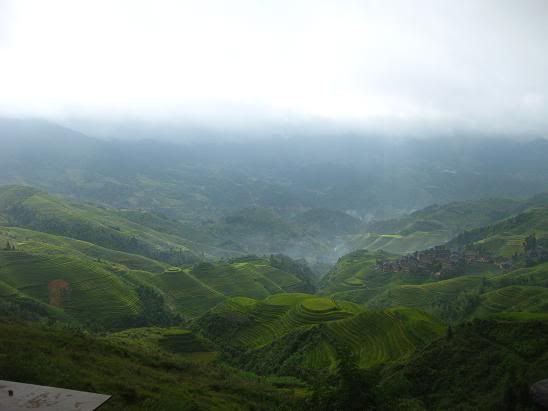
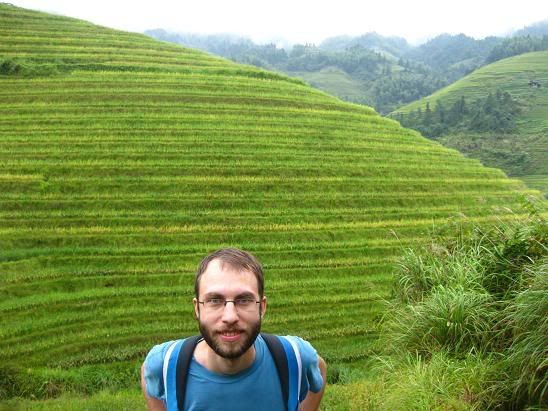
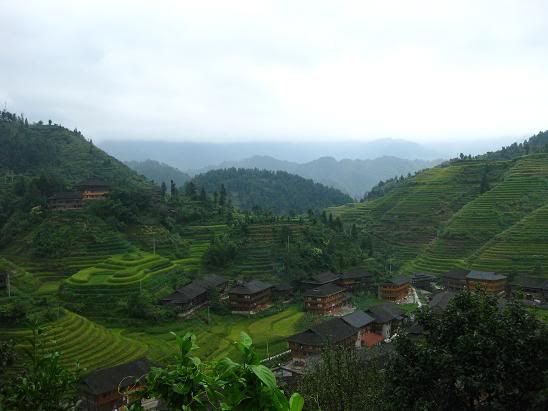
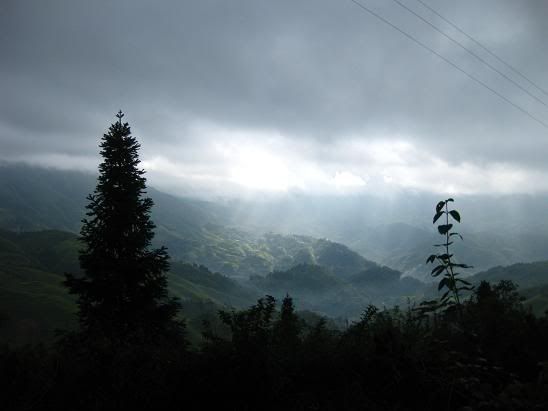
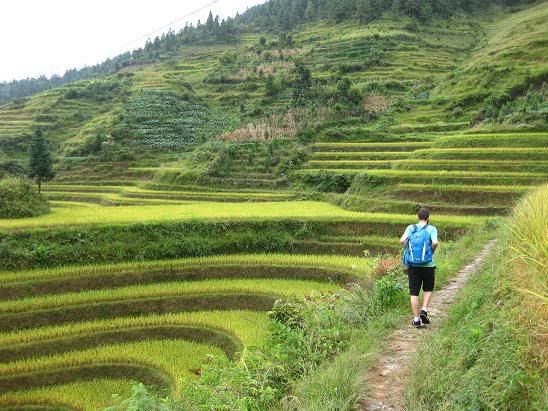
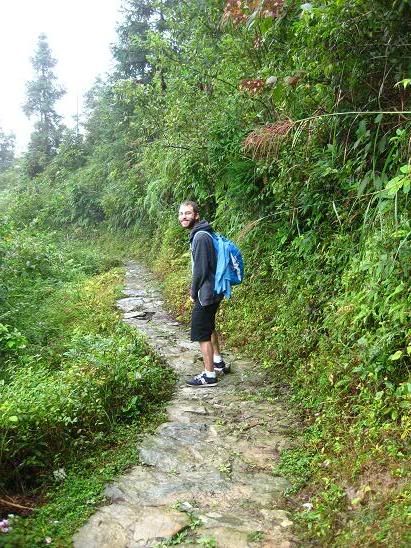
Throughout the course of the hike, I also saw lots of animals, which is always fun. In addition to the chickens, ducks and horses we saw the day before, I also saw a several colorful butterflies, a snake, and inexplicably, a crab. How a crab ended up in the rice terraces, I will never know.
We had been warned that the path was a bit difficult to follow. Indeed, there were numerous forks along the way, and we often had to ask locals which way to go. I've come to realize that Chinese people consistently give the vaguest direction known to man, so most of the farmers just sort of pointed in one direction and mumbled the name of the village we were headed to: Ping'an. At one point, we had gone quite a distance and were unsure if we had taken the right path. Eventually, along came a merry trio of elderly locals, whose voices we had heard echoing of the sides of the valley for quite sometime. The reason they were so loud, it turned out, was because they were utterly drunk at 10 o'clock in the morning. Imagine crossing paths with three wrinkled, babbling septuagenarians carrying a nearly empty gallon-size jug of home brew. Then imagine asking them for directions. They vaguely pointed in the direction we were headed, and carried on their way. I seriously felt like I was in the opening act of a fairy tale.
The hike took us along the ridges of the rice terrace valleys, which allowed for superb views. Sometimes, the path would dip down into the actual terraces. Here, the path narrowed down into a thin strip of stones. If we looked to the right, rice would rise above us. If we looked to the left, rice would descend further down into the valley.
After trekking through a few small villages, we eventually descended into the village of Ping'an, which was a little more built up and touristy than Dazhai, but still very interesting and quaint. During lunch, we were able to catch part of some sort of local ceremony for men. They danced a bit, set off some fire crackers, and played a few songs and then marched through the town. Apparently, someone important had returned to town.
The night before we had decided that instead of staying a second night in the rice terraces, we would haul ass all the way down to Yangshuo. So we caught the bus back to Guilin and again did the old "transfer buses by running across a highway" routine. After arriving, we grabbed our suitcases from the hostel in Guilin and went right back to the bus station and caught the next bus to Yangshuo. We pulled into the Yangshuo bus station at about eight pm. Stephen, the owner of the West Lily Hotel, came out to meet us at the bus station. He led us back to the hotel and checked us in. The West Lily is a small hotel on a quiet street away from the main tourist drag. Our room here is cramped, clean and cheap.
So, what's so great about Yangshuo? It may just be one of those places you have to visit to understand, but its amazing here. Yes, its overrun by Chinese tourists. Yes, touts and hawks follow you around town, trying to get you to buy overpriced bamboo boat rides down the river. But Yangshuo is uniquely beautiful. Everywhere you look, karst limestone mountains shoot up towards the sky like malformed rockets. They are nearly impossible to describe. Misshapen eggs? Green obelisks? Sometimes, they remind me of the mashed potato monolith from Close Encounters of the Third Kind.
Well, I am too tired to write any more. I didn't even get to the last three days. Sigh. More tomorrow. I will leave you some pictures of Yangshuo. It's ok. I know you are jealous.
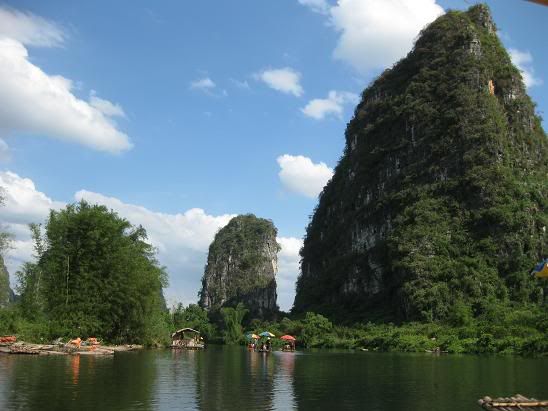

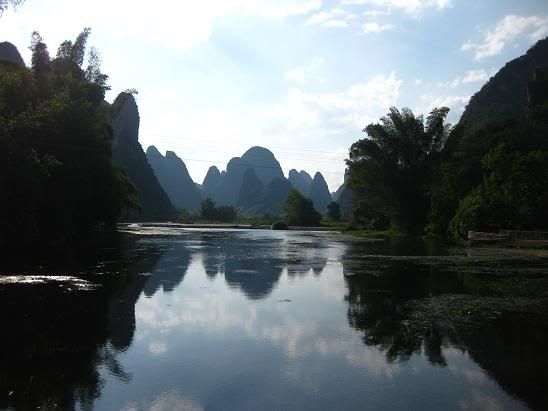
Thursday, September 17, 2009
Dragon's Backbone Rice Terraces
It all started yesterday morning. Well, it really started back in June, when Mimi found a pair of cheap plane tickets from Xi'an to Guilin, which is a mid-sized city in Guangxi Province. Guangxi is basically in the center of southern China, and is widely known amongst Chinese to be one of the most beautiful parts of the whole country. So yesterday morning, we embarked on our voyage to the south of China. Mimi had been telling me for months about Guilin and its inspiring surroundings. It was a special place, she told me, and I was finally going to get to see it.
Fortunately, the flight went off without a hitch. By 2 pm, we had touched down at Guilin's small but functional airport. We took a bus to downtown Guilin and checked into the forgettable but sufficient Xiao Yang Lou International Youth Hostel. Our room smelled a little funky and was adjacent to a rather loud stairwell, but it didn't matter because we would only be there for one night. Our plan was to get up early the next morning and head out to the Dragon's Backbone Rice Terraces.
When people say they are going to Guilin, what they really mean is that they are using Guilin as a jumping off point for the surrounding areas. It's not that Guilin is ugly. It's just that there are much more beautiful places only a few hours away. Still, some tourists stick around Guilin either because they don't know any better or don't want any better. They are happy to walk along the Li River and look at trinkets. But more adventurous travelers head south to Yangshuo, a smaller city about 2 hours south known for its mysterious, alien-like limestone mountains. Here is a picture (that I didn't take):

Before they head south, the most adventurous travelers might first head north. About four hours north of Guilin lies the positively amazing Dragon's Backbone Rice Terraces, which in Chinese are known as Long Ji. That's where we were headed in the morning.
We spent most of the previous night taking care of administrative stuff. Mimi had to get some visa stuff figured out for India, and it took us forever to find a place where we could print and scan stuff. We ended up convincing a concierge at a fancy hotel to scan the document for us, since internet cafes in China apparently don't have printers and scanners. We got a good night's sleep and got up early because we knew we had a pretty long day ahead of us.
The bus station was about ten minutes from our hostel. We walked over and Mimi skillfully located the correct bus. We picked up a few snacks and then boarded the bus, which was seriously awesome looking. From the outside, it looked like any other well-worn Chinese bus. But from the inside, it transformed into a vehicle fit for Ken Kesey and his Mary Pranksters. Perhaps I am exaggerating a little, but its interior wood-paneling, retro upholstery, and bizarre seating arrangement was just screaming: "Take me across the country to San Francisco! I'm ready!"
But no hippies were to be found. Instead, the bus slowly filled up with various Chinese travelers. We were definitely the only foreigners on the bus. According to our directions, we were supposed to take this bus for about two hours, get off in a small town called Heping, and look for another bus to Dazhai, an even smaller village that sits amongst the rice paddies inside the scenic area. After maybe half an hour of traffic in Guilin, we slowly emerged into the countryside of Guangxi. Before I knew it, we were climbing up a mountain. Everything around me was green. Huge valleys lay below me. Misty, foreboding fog hung over the mountains. I couldn't believe it. I was on a crazy bus, surrounded by locals, heading up to some rice paddies in the mountains. Less than a day before, I had been in hideous Xi'an. Things were looking pretty good.
This was the first bus that I had taken in China where I actually felt like I was somewhere truly foreign. Up until then, the buses we had taken had all been in and around major cities. The urban buses are more crowded and a little more hectic than American ones, but they aren't all that different from a bus that you might take back in New York. But this bus reminded me more of the buses we took in Egypt, where passengers are picked up and dropped off not at bus stops, but whenever someone yells, "Let me off!" or "Hey, I wanna get on this bus!" The driver’s inclination to pass cars around blind left turns while climbing a hill also reminded me of the reckless driving I had witnessed in Egypt. Apparently, 600 people die every day in China from driving-related accidents. I kept my fingers crossed.
In addition to the driver, this bus was manned by an organized, vocal woman who not only collected payment, but would periodically open the bus's door and yell out its destination to potential riders. That's how you find out where a bus is going in rural China.
I was having a blast. But before we knew it, over two hours had passed and we hadn't seen Heping, our supposed transfer point. Mimi thought we might have already driven through it, so she asked the lady what was up. She told us not to worry because she would tell us when to get off, and which bus to transfer to. Maybe twenty minutes later, our bus quickly pulled to the side of the road. The driver honked vigorously at a bus going in the other direction, which consequently pulled over on the other side of the road. That was our transfer point!
We quickly hopped on the other bus and headed back in the direction we had just come from. We concluded that the lady figured if she dropped us off in Heping, we would never know which bus to take. So instead she waited until the bus was in sight and then ordered the switch. The second bus was smaller and considerably more crowded. It didn't matter though because no more than ten minutes later, this bus pulled over and a new lady told us to switch to a third bus. Mimi asked a few questions in Chinese, and confirmed that the third transfer was legit. Confused yet?
The third bus was even more crowded than the second bus. Mimi was able to get a seat, but I had to stand for maybe half an hour before a seat opened up. This bus was filled with locals who lived in the region near the rice paddies. They dressed and looked quite different from the people scurrying around Shanghai and Beijing in fashionable clothing and business suits. In fact, one gentleman in the back row was sporting what appeared to be a fresh, gaping wound across his chest. It was unclear where the gash had come from, but he made sure that everyone had a clear view. He had unbuttoned his shirt, in part to give his wound some fresh air, but it seemed more likely that he wanted to show off his wound to his buddies. I tried to play it cool and blend. Yeah right!
After boarding the third bus we had quickly switched roads onto a much narrower, remote path that hugged a small creek. One by one, the locals hopped off the bus at various points. Early on, a young man had approached us to tell us about his family’s hotel in Dazhai, the village we were headed to. He even showed us pictures of the place. But we had already made a reservation at a place that I had picked out, and I wanted to stick to the plan. He was persistent though, and by the time we arrived at the parking lot at the entrance to the scenic area, he was one of the only people left on the bus with us.
I knew immediately that this guy wasn’t going to give up without a fight, and sure enough, he began trailing us as we we began our trek into the village. He asked Mimi a question here and there, about where we were staying and how much we were charged for the room. He warned us that our hotel was over an hour hike up into the mountains, and it would be better if we stayed at his place. A classic trick, I thought to myself. These guys will tell you anything.
So Mimi called our hotel to inquire. Sure enough, the lady told Mimi over the phone that it would take about an hour to hike up to the lodge. Maybe this guy wasn’t so bad after all. He led us to his family’s hotel and suggested we eat lunch there before we continued on. This sounded like a good idea, and the food was actually quite delicious. The highlight was a bizarre tasting sauteed green that reminded us of mint. He told us that all of the vegetables were locally grown and that the tofu was home-made in a neighboring village. Plus, all three dishes we ordered had huge chunks of garlic in them. Dee-licious.
The village of Dazhai was really something special. Its inhabitants are of the Yao minority, who although look Chinese, have different customs and culture than the dominant Han Chinese. For example, the woman all wear more traditional clothing and grow their hair down to their knees, which is then wrapped up in a complex bun that sits atop their foreheads. They also are incredibly skilled in the ancient art of pressuring tourists into buying souvenirs they don’t really need. Three old ladies even went so far as to sit down at our table and hawk their wares while we ate lunch.
Despite the encroaching tourist vibe (which we were obviously contributing to), Dazhai was beautiful. It sits at the bottom of a valley that was giving me some serious Lord of the Rings vibes. The wood cabins, the lush green surroundings, and the hovering fog were simply amazing! Plus, a wild rooster was hanging out with us while we ate lunch. It reminded me of the chicken I had purchased in Pingyao. He’s either on a ship en route to America, or stuck in a customs warehouse somewhere in China. I hope it’s the former.
We paid for our lunch, said goodbye to our friend, and began our trek up the hill. The stone pathway, which was a bit slippery from the rain, wound its way along the actual rice terraces, which lined the sides of the entire valley. As we climbed, it would rain for five minutes, then stop, and then rain again. After half an hour, this occasional rain had thoroughly soaked us. It didn’t matter though, because the higher we climbed, the more exquisite became the views. You’re probably thinking, its just rice, whats the big deal? But these rice paddy terraces were gorgeous. They were just beginning to turn yellow, a pre-cursor to the October harvest. And the way they curved around the edges of the valley created hypnotic patterns. This was definitely the coolest thing I had seen in China so far. Here is a picture (which I also didn't take):

At about five PM, we finally arrived at Quan Jin Lou, or as they call it in English, the Panorama Hotel. The lodge literally sat at the top of the mountain. We couldn’t go much higher even if we wanted to. To our surprise, we were the only non-Chinese tourists who were staying there. We enjoyed the view a bit more before the sun went down, and settled into our room. It has been a long, but wonderful day. We are going to bed early though, because tomorrow we will get up early and conquer a five-hour hike through the terraces to Ping’an, another village a few valleys over.
Tuesday, September 15, 2009
Xi'an: F. U.
Yesterday afternoon, Mimi and I trudged through the rain in attempt to find a post office and send my chicken back to the United States. Mimi had napped, but I hadn't. Instead, I had stayed up and blogged. As a result, I was cranky. Everything was bothering me. Despite being somewhat expensive, the post office was efficient and relatively painless. My chicken is on his way.
By now it was three or four in the afternoon, and we hadn't eaten since morning (another American breakfast at the hostel, shame on me!) We tried to find a Lonely Planet endorsed joint that was supposedly only a few blocks away, but our directions led us into an unpleasant and overcrowded shopping district. As always, people were a bit pushy, as if they had more of a right to get where they were headed than you did. In a way, it was kind of like Times Square, Xi'an style, except this time I was the tourist in a sea of locals. In any event, it was wall to wall foot traffic that was only made worse by the constant rain. Eventually, we gave up on the restaurant and settled for a cheap noodle place we found in an alley.
As we sat down, I noticed that the zipper of my backpack was slightly open. That's funny, I thought, I could have sworn I zipped it up back at the post office. Hungry and underslept, I zipped my bag back up and didn't think anything more of it. I scarfed down the cheap noodles, which were just so-so.The actual noodles were thick and chewy, which I liked, but the sauce was pretty bland the eggplants seemed a bit old.
We finished up and started heading back to our hostel, which was about half a mile away. It was still raining, and we had to venture back through the crowded shopping area. About two blocks from our hostel, a young Chinese man caught my attention and pointed to my backpack. The same zipper was open.
As they say in the movies, there's no such thing as a bad coincidence. I quickly rifled through the pouch and discovered that my U.S. cell phone was gone. For those of you who can picture my phone, yes, it was that one. That five-year old piece of shit that you urged me to replace on a regular basis. I wasn't attached to the phone, but it contained maybe two hundred phone numbers, most of which I had never written down anywhere else. I did another search and found that the only other thing stolen was the cable that allows me to transfer photos from the camera to my computer.
That's right. I got pickpocketed in Xi'an. It was the first time I've ever been pick-pocketed. I guess twenty-six years isn't a bad streak, but I can't help but feel mad at myself. It was a crowded area and I had actually read in Lonely Planet that Xi'an was notorious for petty crimes such as the one I was victim to. Nothing truly important was stolen, but it was the principle of it that kept bothering me. My personal space had been violated. I hadn't even felt anyone touch me. How oblivious of me.
Frustrated, we returned to our hostel and chilled out in our clean but boring room. Everything was annoying me. The weather was shitty. The hostel was full of what I was (unfairly) assuming to be obnoxious, ungrateful Europeans. And I had been pick-pocketed. We had to do something to cheer ourselves up, so we looked for a vegetarian restaurant on the wonderful www.happycow.net, a website that lists veggie restaurants all around the world. Surprisingly, six were listed for Xi'an. Without even realizing it, the time had slipped away and it was almost nine o'clock. Many of the restaurants were no longer answering their phones and I really didn't feel like going on another veggie restaurant wild goose chase.
We ended up walking over to a street that supposedly had some good, cheap restaurants. As usual, we didn't actually find the one we were initially looking for, so we settled for one that looked decently popular. The meal was actually pretty delicious. The highlight was a cold spicy noodle salad that had peanuts, mung bean sprouts, tofu shreds, and lotus root in it. Yummy! In the liquid department, the highlight was my discovery of Hans.
As I mentioned before, most Chinese beers are bland, vaguely malty, and often served warm. Picture day-old, bottom shelf keg beer and you'll be close. Imagine moldy seltzer and you'll be even closer. But Xi'an, a city I was slowly growing to despise, surprised me with a decent local "dry beer" called Hans. It was nothing to write home about (even though that's exactly what I'm doing, I suppose), but it had a crisp edge and a decent after taste. It also packed a whopping 4.5% alcohol content, which is quite high for China. Xi'an, you suck. Hans, you're O.K.
The reason we came to Xi'an in the first place is because it is the home to the legendary Terra Cotta Warriors, a vast collection of ceramic statues that were discovered and excavated in the 1970s, despite being over 2,000 years old. The legendary Chinese emperor Qin Shn Huang had ordered them built to protect him in the after life. Some people consider it the 8th Wonder of the World. They say that after the Great Wall, it's the most essential thing to see in China, and maybe the world.
So the next day, we headed out to see what all the fuss was about. Mimi had already seen the Warriors twice, but was willing to check them out again. To get there, we actually had to take two buses. The first was a local bus to the train station. From there, we were supposed to transfer to a second bus that went all the way to the excavation site, which was about an hour outside of Xi'an. While on the bus, we we're vigilant about my backpack and Mimi's purse. That certainly wasn't going to happen again.
After a short trip on the bus, we got off at the train station and began looking for the 306 bus, which would take us directly to the Terra Cotta Warriors. Like all Chinese train stations, the one in Xi'an was a madhouse. The instant we got off the bus, scammers started offering us over priced tours and taxi rides to our destination. We brushed them aside and began searching for the correct bus. We were a bit lost though, so we wandered way back to where the first bus had dropped us off. Mimi stopped and asked some people for directions. They vaguely pointed in a direction and we headed that way. After a few minutes, Mimi recognized where we were from her time here a few years back, and found the right bus. We climbed on and found two open seats. Can you guess what happened next?
Sure enough, Mimi looked down at her purse and noticed the zipper was open. She rummaged around for a minute. No wallet. How did they do it? Are we really sitting ducks? That's right folks, Mimi and I were pick-pocketed twice in under twenty-four hours. Fortunately, Mimi didn't have too much cash in her wallet and they didn't take anything else from her purse. I thought back to events that just passed? When had it happened? On the first bus? When she stopped for directions? While we were still walking? How could we not have noticed someone unzipping her purse? To their credit, Xi'an pick-pockets are really good at what they do. It's either that or we are two American chumps without a clue. Maybe it's somewhere in between.
Mimi did a much better job than me of being zen about what had happened. No point in dwelling on the past. All we can do from here on out is be extra, super-duper vigilant and keep better track of our bags. I was pissed though. How did they do it?! Were they following us around? Would they strike again? I'm a fuckin' New Yorker, dammit, that shit doesn't happen to me! Slowly though, I came to terms with what had happened and began to put it behind me. I knew for sure I wouldn't be coming back to Xi'an anytime soon though.
The city itself is hardly an attraction. Like Pingyao, its ancient walls are still standing. But unlike Pingyao, nothing of the ancient city remains within the walls. It's modern and dirty all the way. An aspiring Shanghai perhaps, but with less character and more pollution. Moreover, it's not like the city walls have any remaining significance, because the city sprawls well beyond the walls in all directions for miles. God, I hate Xi'an!
To add to all of this, I actually found the Terra Cotta Warriors really boring. Maybe it was because I was expecting something more grand, more jaw-dropping. The guide book had boasted an excavation site the size of an airplane hanger with over 6,000 warriors standing at attention. It turns out that the excavation is ongoing, and that they only "expect" to discover 6,000 statues. In reality, there are maybe a couple of hundred warriors towards the front of the hanger. The rest of the site was either covered in tarp, or had nothing to see. Yes, the statues were really cool, but the presentation was kind of a let down. Maybe I was expecting too much?
After about an hour or two, we decided to leave and worked our way down the 15-minute walk through the tourist trinket gauntlet that separates the site from the parking lot. We caught the bus and headed back to Xi'an. I was feeling a little bit under the weather, but I wanted to check out the city's famed Muslim Quarter. I am a big fan of getting lost in back alleys with various local shops. This had been my favorite thing about Cairo, and exploring back alleys is always high on my list in any foreign city.
The Muslim Quarter turned out to be pretty cool, but a lot of it was over-run with even more touristy trinket shops and stalls. You can only look at chopsticks and oriental fans so many times before you want to vomit. But we were able to find a couple of cool alleys filled with butchers, spice shops, and bakeries. Indeed, the neighborhood had a distinct Muslim vibe, as it remains the primary neighborhood for Xi'ans Hui community, a sect of Chinese Muslims. We tried various a bunch of different snacks, the highlight of which was an incredibly spicy piece of grilled bread. Weird, but tasty.
By the end of the day, we were really worn out and felt somehow beaten down by Xi'an. We decided to bring up our spirits by eating the vegetarian meal that had eluded us the night before. Our destination: a restaurant adjoining a Buddhist temple that was a couple miles outside the city walls. If it was anything like Jade Buddha Temple Restaurant in Shanghai, I knew we were set.
The crowded and jerky bus ride to the temple was only made worse by my pickpocket paranoia. We decided to get off a few stops earlier and walk the rest of the way.
We were really excited for this meal and were near ecstatic when we found the place. At that point I don't think we could have handled another curve ball. When we got to the restaurant, however, we were saddened to find that there was no English menu. Mimi speaks great Chinese, but she can't read very many characters. No pictures of the food either! One of the best parts of any Chinese meal is getting to look at the pictures and read all of the funny English names of the dishes. Mimi did her best to order us some delicious dishes and we settled in. Lucky for us, the food was excellent. The mock meats were quality and the veggies were fresh. Best of all, they had bottles of Hans. All in all, the meal was a great ending to our time in Xi'an.
Now all we had to do was get the hell out of town.
Sunday, September 13, 2009
Pingyao To Xi'an
I forget where I left off when I was talking about Pingyao. I do remember going into quite a bit of detail on my copper chicken. A brief update: After I purchased the chicken (still trying to come up with a good name...) we tried to find a post office. Eventually we found one but they said they could only do it express mail for a very expensive price. The woman wasn't very helpful but seemed to imply we could get a better price in a bigger city. So the chicken is currently weighting down my suitcase in a major way. Dang.
On the second day we were in Pingyao, I rented a bike on my own while Mimi took a nap. The bike was very crummy and definitely way too small for me, but at about $1.25 for a day's rental, I wasn't about to complain. Having walked around Pingyao plenty at that point, I decided to venture out beyond the ancient city walls and see the "real Pingyao." Boy was it ugly. I biked around for about two hours, only to find block after block of run-down buildings, motor scooter repair shops, and other small commerce. The whole city had a dusty haze over it, and the "up and coming" vibe I felt in Beijing and Shanghai was completely absent. Pingyao felt poor. It was by no means depraved. In certain parts of the city things were definitely bustling. But it felt more like Cairo to me; a city that was on its way down, not up.
After a few hours of aimless wandering on my rented bicycle, I headed back to the hostel and woke Mimi up from her nap. I liked Pingyao inside the walls. It was peaceful, pretty and comforting. But it wasn't a place I would want to spend more than a few days. By the third day, we were out of things to do. We thought about taking a bus to some ancient underground tunnels about two hours out of town, but decided to take it easy so Mimi could continue to recuperate. On our last day, we instead rented bikes again and biked about three miles out to a modest Buddhist temple on the outskirts of town. To be honest, it didn't really do much for me, and I got bored at the temple pretty quickly. The highlight was when a monk gave Mimi a good luck charm (for a small donation) and hummed her a little Buddhist song of peace.
We biked back and got some soup and dumplings for dinner. We were ready to get out of there, but our train wasn't until 11 PM. We hung around the lobby of the hostel for a few hours, and eventually took a pedi-cab over to the train station. This was my third overnight sleeper, and I have to confess that the novelty may have finally worn off. This time we were on the top bunks. In the middle was a Chinese couple, and on the bottom were two other backpackers who I think were from Ireland. The lights on the train had already been turned off for the night, so we had the pleasure of storing our bags and getting situated in our bunks totally in the dark.
It was another night of endless 45 minute naps, and by the morning, I was decidedly grumpy. The hour-long delay and the rain certainly didn't help things. Right now I'm trying to find us a good place to stay in Hong Kong and Bangkok. Both places have so many options that I'm a little overwhelmed. Right now I'm just trying to figure out which neighborhood to stay in, let alone which hostel or guesthouse to go for. I can't go out an explore Xi'an because its pouring rain. I guess I'll just have to write more blog entries all afternoon!
Coming up next, an entry about all the FOOD I've been eating over the past two weeks, and then another entry about all the stray dogs in Pingyao. You can expect a detailed photo gallery for both. I tried to upload teaser pics but photobucket is being dumb. Arg.
Saturday, September 12, 2009
Pingyao
The drawback is that Pingyao is decidedly touristy. The buildings here are gorgeous and its great fun to wander down the various alleyways, but the main pedestrian drags throughout the town are lined wall to wall with souvenir shops and hotel/restaurants that cater to Europeans. And yet, walking down these streets has been one of my favorite things so far in China. Despite all the trinket vendors, the city is peaceful and legitimately authentic. You can't help but feel that this is what so many other Chinese cities were like before they were torn down and replaced with high-rises and shopping complexes. On the other hand, who am I to say that Pingyao doesn't deserve the modernization underway in the bigger Eastern cities? But I guess that's for another post...
Today is our last day here. We have been staying at the absolutely wonderful Yamen Hostel. Like many of the hostels and inns in Pingyao, Yamen opens up into a series of beautiful courtyards once you go beyond the front lobby. Our room was in the first courtyard, and when "Robert" led us into our room, it was so big that at first we thought it was a common room shared by several other rooms. After all, we were paying under $5 per person per night, so we weren't expecting much. But Yamen hooks it up. Our room had a huge bed that overlooked the courtyard, two huge wooden chairs, plenty of space for luggage, and a clean, private bathroom. After a restless night on the train, this room was a gift from heaven.
After napping for a few hours, we took showers and went out to explore the town. It is free to wander the streets of Pingyao, but if you want to go up on the city walls or enter any of the buildings deemed historically significant, you have to pay the equivalent of $20 for a city pass. Given the length of our trip, we decided to conserve money and not get the passes. After all, we could explore the city on our own and get plenty of the flavor without seeing the inside of an old bank. Maybe were missing out on something, I'm not sure. So we spent most of the day wandering around, looking at the various stores, nibbling on street snacks, and getting lost in the alleys.
Unfortunately, Mimi had begun to feel ill on the train and her stamina remained low once we got to Pingyao. We took that day pretty slow and Mimi went to bed early. By night time it was clear she had more than just a sniffle, and we made sure she got plenty of rest so she could beat her fever as quickly as possible. In fact, as I write this, Mimi has been asleep for a solid 12 hours. Wow!
The next morning I got up bright and early. I wanted to stick around the hostel to help take care of Mimi, so I ordered breakfast from the hostel. For unknown reasons, perhaps a deep hidden craving, I ordered a Western style breakfast that was really more like a British breakfast. It consisted of scrambled eggs, white toast, baked beans, a cooked slice of tomato, and a hash brown medallion the size of a Sacajawea. Had I been served this breakfast in America, I would have laughed. But after almost two weeks of Chinese breakfast, I was actually pretty stoked.
We spent the rest of the day doing more of the same type of wandering around the city, which I was more than happy to do. The streets of Pingyao are quite charming, and there is plenty of stuff to look at and fiddle with. You just have to fend off the shop owners from coaxing you into a purchase. Mimi had come out with me for an afternoon stroll and some lunch. We had made it halfway down the main drag when I saw it.
Now, I'm no fan of meaningless trinkets. In fact, I hate useless clutter and own very few non-utilitarian objects. When I buy expensive things, I like them to have a purpose, such as the small laptop I'm currently typing on. But every once in a while, you see something and it hits you. You say to yourself, I pretty much have to own this object. I need it. For me, on that fateful overcast afternoon in Pingyao, that object was a 18 inch copper sculpture of a chicken. This thing was just calling my name. It spoke to me through its eyes: "Buck, Buck. Michael! Buy me! Buck, Buck." What do I do?
Now, in China, the price of anything you buy on the street is negotiable. The Chinese know that Americans are suckers, so they set the price almost twice as high than they would for a Chinese person. That way, when the American tries to bargain, they get the originally absurd price down by 10% and feel like they've really pulled their weight. In reality, they are still getting totally ripped off. So the rule of thumb for foreigners is to pay around 30% of the original asking price. As Mimi's father put it, "Don't cut them at the waist. Cut them at the ankles."
The shopkeeper's opening bid was 550 RMB, which translates to $80 USD. This was, of course, an absurd price. We balked at the price and walked down the street. Behind us we could hear (in Chinese), "OK 500." Pause. "OK 400." Pause. "OK 200." Nothing more. That means 200 is as far as he'll go. About $30. I wasn't even sure if I wanted to buy the chicken at that point. But as the hours went by, I couldn't get the chicken out of my head. What a cool thing to own! A giant copper chicken! If I bought the smaller version, which was maybe 1/8 in size, I'd surely lose it at some point, or lose interest in it and give it away. But if I get the big guy, he'll be mine forever.
Later in the evening, we did a bit of price shopping. Several other shopkeepers had the same chicken. I knew we could find out what the best price was because Mimi speaks Chinese and could get us a much better price than any other foreigner. She's a mean negotiator. One guy opened his bid as high as 650 RMB, and no one was willing to go anywhere lower than 200. We went back to our original guy for another round of bargaining, but were only able to get him down to 190. You could tell he was getting to the breaking point and he didn't even really want to sell it for that little. We told him we'd be back tomorrow.
Flash forward to today. What can I say? I bought the chicken. Like I said, it had my name on it. I put rationality aside and bought an incredible near life-sized chicken. Besides, the rooster is good luck in China. All I gotta do then is figure out a way to ship it home, because there is no way I'm carrying that thing around for the next month. Look!
Friday, September 11, 2009
Train to Pingyao
One funny thing about her apartment building is that it is just around the corner from the Russian Embassy. Consequently the neighborhood is inhabited by.. well.. Russians. And not just the diplomats. They brought their high-heel wearing, perfume drenched wives as well. And their kids! Maya's favorite grocery store is a little shop that caters to the Russians. It's great because you can get a lot of foreign food products, but at much lower prices than some of the other "Western food" stores, which as I mentioned are often a total rip off. This particular store also had a vast colletion of import name-brand liquors. What confused me was that in the vodka department I could only find Absolut and Skyy. They weren't even going to carry Stoli? I turned the corner of the aisle to point this out to Mimi when I came across perhaps the largest collection of Russian vodkas I've even seen. There were maybe 30 of them all lined up along a shelf, and I hadn't heard of any of them. The owners of this establishment clearly understand the needs of their clientele.
We had done a big load of laundry the night before, and by the late afternoon on Thursday, we were still waiting for some things to dry (no dryers in China, it seems). By 4:45 in the afternoon, the last pair of undies had finally dried. We packed our bags, said goodbye to Maya, and then took the subway over to Beijing Train Station West, a slightly smaller station with a reputation for being crawling with pickpockets. I wasn't particularly sad to leave Beijing. We had been there for nearly five days and I felt that I had gotten a good taste of the city. We hadn't made it out to the Summer Palace (another classic tourist destination), but I had wandered the streets, seen the Great Wall, and had a couple of delicious meals. And besides, we were really excited for our next destination, the ancient walled city of Pingyao.
The train station was approaching chaos by the time we arrived. Rush hour had just hit and the place was packed. The place seemed to be heavily patrolled by the police, but I paid close attention to my wallet just to be safe. As always, I kept the main portion of my stash and my passport in my money belt. We eventually made it over to the appropriate waiting area, which had a line nearly out the door. We opted to line up at what I like to call a tributary -- an unnoficial second queue that branched off from the first one at about the halfway point.
After staking out our territory and making prelinary preparations for the battle that would be boarding the train, I left my bags with Mimi and went to find the bathroom. The following anecdote isn't exactly required reading, but its another example of how China -- despite lurching towards modernization in every conceivable way -- still has its own bizarre habits that I simply don't understand. If you don't like reading about pooping, stop here and skip to the next paragraph. Consider yourself warned. Most public toilets in China are of the squat variety. As I mentioned, Chinese people love to squat as a resting position, so why shouldn't they prefer to squat when using the bathroom? It was no big deal, really. In fact, I had completed my first squat poop no more than 36 hours prior. In some of the Hutong (alleyways) public bathrooms, however, the squat toilets didn't have private stalls. On one occasion, I had entered one of the quite smelly public bathrooms, only to find a Chinese gentleman squatting before me, reading the morning paper as he did his business. As I said, no big deal. But something strange was happening at the bathroom in the train station. There were maybe six squats with stalls in them, all occupied. As I waited for a urinal to open up, I noticed that a custodian or janitor of some sort kept popping open the squat doors and yelling stuff at the squatting men. He must have done it to three separate stalls, and on all three occasions the man in the stall remained calm and composed, despite what I would perceive to be his compromised privacy. Unable to speak Chinese, I was never able to find out what the hell was going on in this bathroom. Why was he popping open the stalls and yelling at the pooping men? Why were they so unphased? Somethings, I suppose, are better left unknown.
Anywaaaaaays, about thirty minutes before departure, the gate opened and the battle began. People were out for blood. Almost instantly, I was separated from Mimi. I felt the crush behind me, from the sides, and inexplicably, from the front as well. Why is everybody pushing, I thought. But I was prepared this time, and began pushing back, using my rolly polly as a blocking device, just as I had seen the old ladies do in Shanghai. We eventually made it onto the train, which from the outside appeared a bit older than the one we had taken from Shanghai earlier in the week. The inside was basically the same, but had a slightly different layout in terms of the baggage storage. As before, we had the middle bunks. Below us sat an older Chinese couple. The woman was holding a 3-year old girl, and after fifteen minutes of "Where's my daddy?!?! I want my daddy!!!" we concluded that the grandparents were taking of their granddaughter for a while, and the baby girl was not too happy about it. She missed her daddy. I am proud to say that I was able to understand what the girl was saying in Chinese. I kept hearing the word "baba," which is the casual word for "dad" in Chinese. This is easy for me to remember, because Baba is what I call my grandmother! So Mimi and I both have Babas; they're just a bit different from each other. Anyways, directly above us were two non-descript women who spoke a dialect that Mimi couldn't understand.
The train voyage itself was pretty uneventful. We ate some instant noodles that we had bought earlier in the day, as well as left over peanut butter and jellies. We were scheduled to arrive at 7:30 AM the following morning, so we tried to get to bed early. I had a very rough night of sleep and kept waking up everytime the train stopped at a station, which, despite being the middle of the night, seemed like every forty-five minutes or so. I was also paranoid that we would somehow miss our station, a fear which turned out to be completely unfounded. The conductors make absolutely sure you get off, because on crowded trains your berth will often be reoccupied by a new traveller further along on the route. After a restless night, we arrived in Pingyao at about 8:15, well behind schedule. We were tired, but very excited to be in a new and foreign city, a bit deeper into the interior of China.
Thursday, September 10, 2009
Three Days in Beijing
On the morning of our first full day here, I decided to go exploring on my own for the first time since we got to China. I was eager to check out Tiananmen Square and the Forbidden City, but Mimi wanted to catch up with Maya and escape the entrance fee for sites she had already seen several times before. I took the subway down to the center of the city, and looked to find an entrance into the square. We had walked around there the night before (in search of the vegetarian restaurant), so I was decently familiar with where I had to go. The problem was that every time I tried to use one of the underground pedestrian tunnels that led to Tiananmen, it was blocked off. When a guard told me in broken English that "Tiananmen closed. Come tomorrow," I realized my plans had been foiled. I thought I could skip Tiananmen, and go to the Forbidden City, but all the roads leading there were blocked off as well. So I got back on the subway and got out at the entrance to the Forbidden City, only to find that the number one tourist site in China, which is open literally 365 days a year, was inexplicably closed for the day. Bummer!
So I made the most of the situation and walked around the surrounding areas, most of which were unfortunately quite touristy and shopping oriented. I was, however, able to wander down a few of Beijing's "Hutongs," which are the narrow alleyways that criss-cross each other in between the giant boulevards. Beijing is known for its Hutongs, but the ones I walked along were lined with rather drab, modern buildings. The alleyways were also surprisingly abandoned, which was actually a nice surprise.
After a few hours, I took the subway back to Maya's. We spent the rest of the afternoon (and into the early evening) at a supremely awesome art district known as 798. It took us a little under an hour by bus to get out to 798, which inhabits a long-ago abandoned electronics factory. Like so many other things in Beijing, the factory area itself was sprawling, eating up perhaps the equivalent of maybe 30-40 New York city blocks.
798 was the first authentic contemporary Chinese art movement (and district), and the original artists who worked in the converted studios are now all apparently millionaires. Just as Soho and Chelsea are unrecognizable from their original forms, 798 no longer has any active studio spaces, but is instead a collection of galleries, cafes, boutiques, and a few actual museums. And like any contemporary art district, much of the art was quite uninspiring and most of the boutiques and cafes seemed overpriced and self-consciously fashionable.
However, in addition to a couple of cool photography exhibits, it was great to know that such a place existed in China. For those of you who think that China is still a communist backwater, you are dead-wrong! The major cities are thriving, and have legitimate art scenes. Yes, it is true that much of the more controversial work is censored. It is very difficult to directly challenge the political status quo through art, or any other means for that matter. China remains a totalitarian country.
And yet, as a result of the bizarre system of totalitarian capitalism, art culture has become a necessity. Whether in China or anywhere else, the urban middle class with a bit of money to burn will demand art and culture. Just ask Marx! Didn't he talk about the bourgeoisie requiring this kind of distraction? I actually don't exactly know what I'm talking about, but you get the idea.
The absolute highlight of our trip to 798, however, was a gallery that presented a single work of art. Without beating around the bush, it was a giant, beautifully rendered sculpture of a bull who had farted so hard that he blasted into the air and crushed a man against the wall of the gallery. This had the effect of cracking the wall behind the man, as well as creating a five-foot crater of rubble in the middle of the gallery -- the aftermath of the bull's powerful flatulence. Apparently a comment on the financial crisis (the bull being the Wall Street bull and the man representing Bernie Madoff), I enjoyed the piece for its elegant construction of such a comical, cartoon-esque scenario. Two monitors showed "making of" documentaries that brought this point home by illustrating how complex and challenging it was not only to build the sculpture, but to transport it to the gallery. Anyways, perhaps I am rambling a bit, but the 798 art district was really cool!
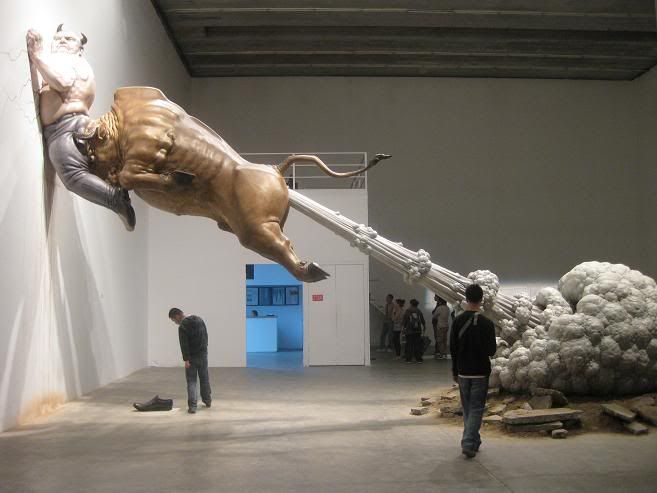
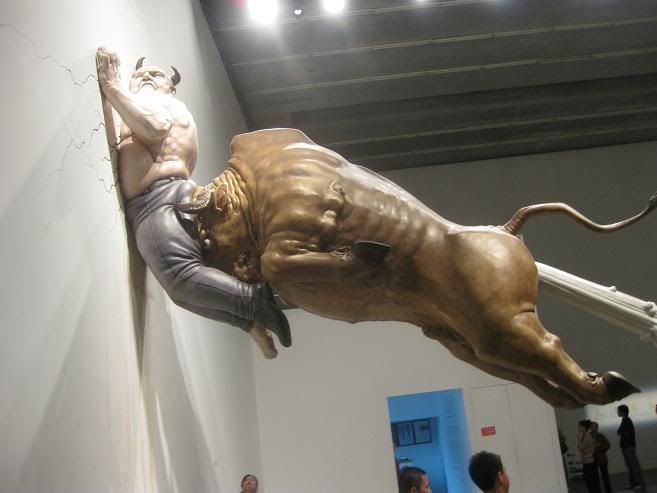
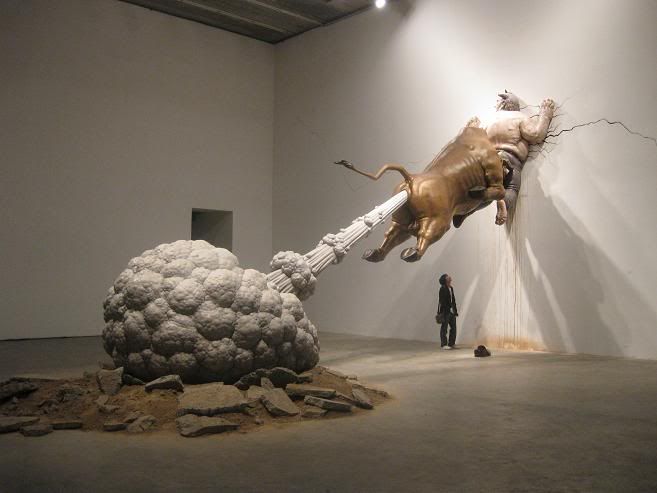
The next day, Mimi and I rented bikes from a guy near Maya's apartment and biked back down towards the center, to give the Forbidden City another attempt. I'm no Chinese history buff, but the Forbidden City is really amazing. It was home to Chinese emperors for centuries, and has these immense courtyards. The sheer size of the place is what really stuck with me. Yes, Ming dynasty vases are cool to look at for a little bit, but as Mimi points out, walking through the actual spaces that were inhabited is so much more exciting than looking at relics as if you were in a museum. The Forbidden City was of course very crowded and filled with various tourist groups, both Chinese and European in make-up.
After a few hours, we had our fill and walked back to our bikes, which we had locked up by some guards near the front gate. We then went on a really awesome bike tour that we found in the Lonely Planet guide. I should mention that biking in Beijing was a truly exhilarating, albeit potentially life-threatening experience. Imagine you were driving along the Autobahn in the 1970s, or perhaps a deadly stretch of Italian motorway. Now imagine that half the cars around you had turbo booster packs that allowed them to wiz by you at twice the speed. Now imagine that there were even bigger vehicular beasts constantly honking at you and eating up your lane. Now imagine all of that except with bikes. I'm beginning to think I should have abandoned this analogy six lines ago.
In any event, that's a bit what riding bikes in China is like. Not only do you have to share the road with aggressive cars, but you have to share it with the motor bikes as well, who act like they are bikes in terms of their routes and maneuvers, but go twice as fast. Imagine all that, and then imagine approaching an intersection four lanes wide in all directions, where cars, motor bikes, bikes and pedestrians all vie for a piece of concrete at the exact same time. Crossing the street on a bike in Beijing was scary, but more fun than any video game I can recall ever playing. (Sorry to make you worry mom and dad; I'm OK!)
Anyways, the tour led us back around the Forbidden City and over to a really beautiful lake to the northwest. The tour was designed to take us through some of Beijing's more classic Hutongs, perhaps in attempt to show a more traditional slice of urban Chinese life. After stopping for a cheap but decent lunch, we continued winding across the city, ending up in a really cool section of alleyways that housed a variety of bars, cafes and shops. It seemed designed to attract both foreigners and locals with fat wallets, but it was still fun to bike around and take a look. We even found a bar blasting metal called "Guitar Bar." The tour ended on a much more local Hutong, where the street was lined with small fruit and vegetable carts.
I had a blast biking around Beijing, and I can't wait to rent bikes again. That night, we met up with some of Maya's friends for dinner. It was an interesting combination of us, some French ex-pats living in Beijing, and a couple of friends who were also visiting from the United States. However, much of the conversation was in French, so Mimi and I fiddled with our chopsticks and played it cool. Can't win 'em all!
The next day, Thursday, we conquered the Great Wall of China, which the Chinese actually call the Long Wall. They leave off the "of China" part for obvious reasons. Most tourists visit the Great Wall at a refurbished strip only about an hour outside of Beijing. This section of the wall is apparently overcrowded with tour groups who basically want to get a picture of themselves on the Wall, and get back to Beijing. A tourism assembly-line kind of operation.
Mimi suggested that we instead go the extra two hours (three hours in total) out to the more remote section of the Wall where you can actually hike on it for long distances. And boy was it worth it. After a slight fiasco with the local buses, we eventually made it and began our ascent to the Wall. If you've never seen the Great Wall, I don't know how much of a point there is in describing it. As corny as it is, it's just once of those things you kind of have to experience. It's so long! It goes on forever!
The hike was also incredibly physically demanding because the wall goes up and down and up and down and up and down. Along this particular stretch, some of the steps were so steep you had to climb with your hands to get up to the top of the towers. The hike was also really cool because long sections of the Wall hadn't been refurbished in hundreds of years, which gave it a much more authentic feel. The downside was that this made it much more difficult to climb, as the rocks forming the wall had become quite dilapidated over the centuries. In certain sections, the wall had become overrun with weeds, which was really cool.
By the end of the four-hour, ten-kilometer hike, our legs were really hurting. We started taking increasingly frequent breaks, hoping for the end. Chinese women troll the wall waiting for the tired and the meek to cave in and give up. They pounce on these week prey and take them down a secret valley path which bypasses the challenging ascents and descents of the wall. Then when you get to the bottom they force you to buy $20 of crappy Great Wall souvenirs. One of these ladies was literally trailing us for a couple of kilometers and eventually Mimi had to tell her to buzz off. We were going to finish the hike no matter what! And so we did.
At the end of the hike lies a giant valley which you must hike down to get to the parking lot. If you want, you can shell out about $6 to take a zip line across the valley and over a lake. Somehow, Mimi convinced me that we should do it. I'm no fan of heights, and I'm not particularly convinced that Chinese safety standards are up to par, but I figured... I'm at the Great Wall of China and I have to opportunity to zip line across a giant valley. I should probably do this. And so we did!
It goes without saying that we passed out on the bus ride back to Beijing. When I woke up, my legs felt like Jello. Two and a half days later, and I'm still feeling the Great Wall in my calves.
Beijing is Ma Ma Hu Hu
While the urban structure of Shanghai is convoluted and labyrinthine, Beijing is laid out on a huge, systematic grid. Like Los Angeles, it seems that it takes at least an hour to get anywhere in Beijing. It's super spread out, and there are plenty of traffic jams to go around. While Shanghai has narrow, busy streets, Beijing has broad avenues that form rings around the Forbidden City, which is found at the center of the city. You can also feel the government presence more in Beijing. There are government buildings strewn around the city, not to mention the countless embassies.
People here say that much of Beijing's new vibe can be attributed to the 2008 Olympic Games. The Chinese government invested vast amounts into public infrastructure and made a concerted effort to "clean up" the city. So while Shanghai remains under constant construction, most of the urban modernization in Beijing has already taken place. It is true that Beijing is an efficient city, but there is just something lacking here.
To put it more bluntly, Beijing is kind of boring. It may true that there are infinitely more museums and "sight-seeing" destinations in Beijing, but in terms of street food and culture, not to mention the overall vibe and pace of the city, Beijing is tepid. It's just too laid back for a city that claims to be a major cosmopolitan metropolis. That being said, I have had a really fun time here, and got to experience one of the most marvelous structures ever created by man: the Great Wall.
Monday, September 7, 2009
REEB
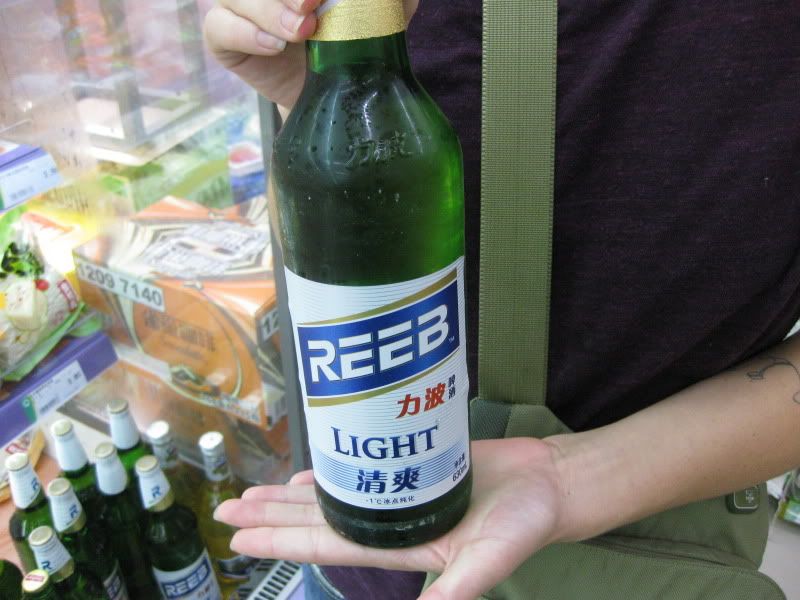
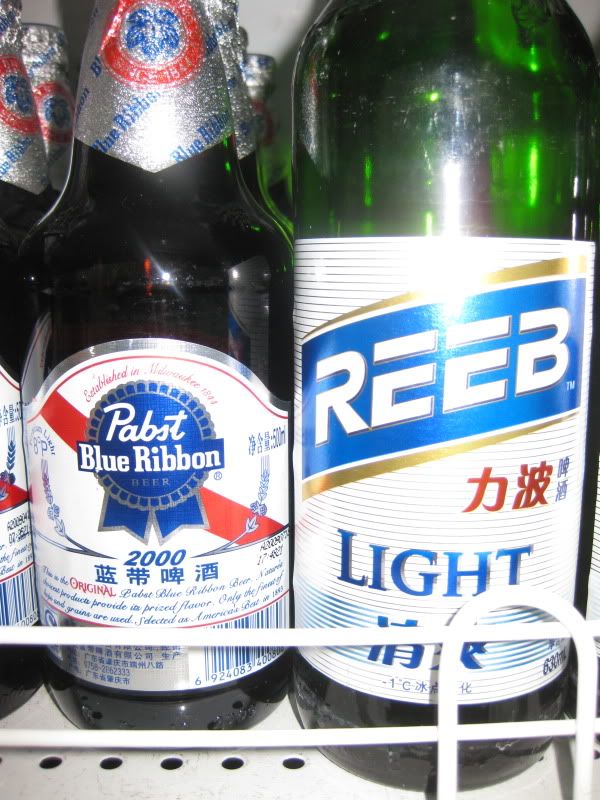
Sunday, September 6, 2009
A few technical updates
Also, the map on the right of my blog seems to have gone totally haywire, so I'm going to delete it for the time being.
Stay tuned for more updates!
Train to Beijing
So after a relatively uneventful last day in Shanghai, we said our goodbyes to Mimi's father and headed over to the Shanghai train station. As you may or may not know, the concept of a line is a relatively new phenomenon in China. According to Mimi, even Chinese people make fun of themselves for their inability to line up in an orderly queue (as the British say). I had already gotten a taste of it when we boarded the plane in Toronto. So when we arrived at the train station I was prepared for the worst. Indeed, at every juncture I had to fend off intruders from cutting me in line or stealing away my position. And in true Shanghai form, most of the belligerents were old ladies, armed with their own rolly polly suitcases as a strategic blocking mechanism.
When we got to the waiting room for our train, it was already packed to the brim with other travelers, many of which seemed to be college students returning to school. About twenty-five minutes before departure (9:58 PM), the doors were opened and we managed to worm our way onto the train. Unfortunately, I didn't get to see very much of the train, because we went straight to our car to stake out a place for our bags and get situated.
The sleeping car was very cramped but also pretty efficient. There were maybe ten sections in our car, each of which had six bunks stacked three high on each side. Along the narrow corridor were fold up chairs and above that was a rack for baggage. We had the middle two bunks, which according to Mimi is the worst draw. Below us were two middle-aged Shanghai ladies who were going to Beijing for a weekend of fun. Above Mimi was a German law graduate who was doing an internship with the German Consulate in Shanghai. At first, it wasn't clear who would be above me, but about an hour after the train was in motion, a young man hopped up above me, fell asleep within five minutes, and began immediately snoring. This continued until the next morning, at which point he got up, ate a huge bowl of instant noodles, and then went back to sleep until we arrived. This guy clearly had the Shanghai to Beijing train routine down pat.
For most of the trip, the German guy worked on his Chinese with the two ladies on the lower bunks. The ladies were having a blast and seemed to get a real kick out of his earnest desire to learn the language. They also learned a few phrases in German. In the morning, we kept hearing them say, "Gutentaga." From time to time, Mimi chimed in on the conversations (which were all in Chinese) and over all it was a really fun experience for me. I wasn't able to sleep all that much -- maybe five hours total -- but overall it was a really cool experience. We have at least 3 more overnight trains ahead of of us in China, and countless more in India, so I was glad to get at least one under my belt.
Unfortunately, for most of the trip there wasn't much to see out the window. For starters, it was already dark when we got on the train, and the conductors/attendants insist on closing the blinds until the morning in order to keep it dark. In the morning, I looked out from time to time, but I mostly saw drab, dilapidated buildings dotting the scenery. The beautiful landscapes must be somewhere else in China.
We arrived in Beijing at around 11 AM and Mimi's friend Maya met us at the train station. Mimi knows Maya from the year she spent studying in Shanghai after high school. Maya then moved up to Beijing and has been living here since, working as a freelance photographer. We spent the rest of the day recuperating and did a little bit of wandering. At night, we tried to find a reputable veggie restaurant but ended up getting very lost and frustrated. Eventually we found it though and the food definitely hit the spot. Quite tired from the train trip, we went back to Maya's apartment and crashed early.
